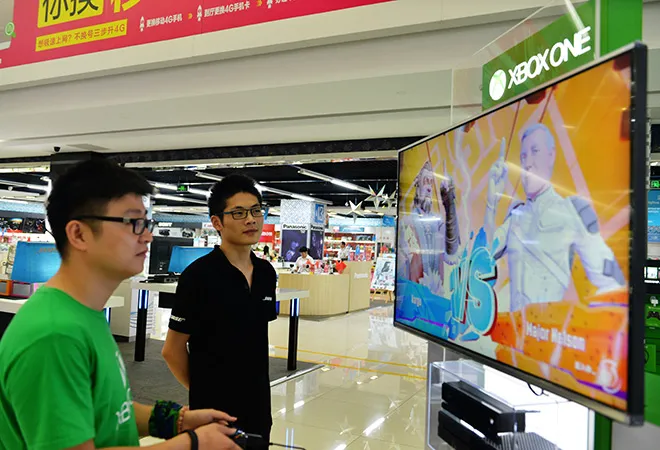
Chinese gaming industry is often left out of the conversation on China and tech, but it is or maybe was one of the
fastest-growing domestic tech sectors. Also referred to as the “Gaming Industry Capital of the World,” China makes up around 25 percent of the global video game industry. There are
approximately 665 million, half of China's population, players in China alone. The sector grew stronger during the pandemic. Sales revenue of cloud gaming and e-sports
grew by 79.35 percent and 53.69 percent respectively, during the first half of 2020.
The growth of the mobile gaming industry in the grey zone left by the
ban on gaming consoles from 2000-2015 was fuelled by the middle class’s greater access to smartphones and the internet. At present mobile games
worth US $32 billion occupy the largest market share. Mini-games played inside ubiquitous mobile apps added the social element to gaming. Later on,
e-sports took the popularity of the gaming sector a notch up.
In 2016, China put restrictions on the predatory micro transactions tool in games—loot boxes, which contributes to youth gambling addiction. But companies developed their way around the loot box disclosure laws.
However, the industry is in a state of flux when China is trying to rectify its internet industry at large. In August this year, China
imposed “the world's strictest limits on video games” to “curb video game addiction among children and effectively protect the physical and mental health of minors.” It allowed minors to play from 8 am to 9 pm on Fridays, weekends, and public holidays. Since state media agency Xinhua Finance published an
article criticising online games as ‘spiritual opium’ and ‘electronic drug,’ the industry anticipated some regulatory wrath. The very next day,
industry leader Tencent announced
a self-imposed curb on playing time. This was not the first time that state media has lashed out at the gaming giants. In 2017, People's Daily had
criticised “addictive” online games, including Tencent's Honour of Kings, for disrespecting Chinese history, devaluing Chinese values, and poisoning the Chinese society.
China has been trying to limit the negative influence of gaming on its young population for the past few years. 13.2 percent of China's minors
reportedly played games for over two hours per day on weekdays. In 2016, China put restrictions on the predatory micro transactions tool in games—
loot boxes, which contributes to
youth gambling addiction. But companies developed their
way around the loot box disclosure laws. In 2018, China
froze approvals of new video games, including Player Unknown's Battlegrounds (PUBG) and Fortnite. The same year, China
lost its top position in the global gaming market to the US. The gaming frenzy gave birth to a new profession, ‘
gaming companion.’
Afterwards, Beijing realised the need to regulate gamers’ behaviours. In 2019, National Press and Publication Administration
issued comprehensive regulations for online games. It mandated minors to use their real names and IDs while logging in, and that too from 8 am to 10 pm. It allowed them to play 90 minutes on weekdays and three hours on weekends and public holidays. It further limited the in-app purchases like virtual weapons, clothes, and pets from US $28 to US $57 per month, depending on age. In 2021,
Mobile Game Content Standards were also revised. China Audio-Video and Digital Publishing Association (CADPA) rolled out the pilot phase of
Online Game Age-Appropriateness Warning following a parental outcry over inappropriate content.
China Audio-Video and Digital Publishing Association (CADPA) rolled out the pilot phase of Online Game Age-Appropriateness Warning following a parental outcry over inappropriate content.
However, young gamers find some way in the shadowy pockets of the internet to surmount the restrictions.
Reports about the sale of fake IDs for as low as US $2 for gaming purposes have surfaced since 2017. Tencent
sued 20 online services that were illegally trading adult IDs for its games this year. Under its
Balanced Online Entertainment System initiative, Tencent rolled out the so-called ‘
Midnight Patrol,’ whose
trial started in 2018, amidst the scrutiny of Honour of Kings. This feature will track late-night playtime as well as expenditure and generate a prompt for a facial scan. The player will be treated as a minor if the facial scan is refused and removed from the game. Last month, China Game Publishers Association Publications Committee (GPC) published the
Online Gaming Industry Anti-Addiction Self-Regulation Convention, which pledges strict implementation of minor-related regulations and aims to “resolutely boycott circumventing regulatory procedures and using overseas gaming platforms to provide services to domestic users.” China has
reportedly slowed down approvals of new games once again.
Reports during the ‘Golden Week’ show children are still finding loopholes to tune in to games. The addicted ones who are unable to gain adult IDs through pressurising, stealing, or trading are trying to
find cracked versions of the games. Livestreaming apps, such as Tencent-backed Huya and DouYu, and short video apps to watch but not play games are the only choices left for the rest of them. China had banned the foreign live-streaming platform
Twitch in 2018. It won't be a surprise if it takes similar measures against its home-grown platforms as well.
The views expressed above belong to the author(s). ORF research and analyses now available on Telegram! Click here to access our curated content — blogs, longforms and interviews.



 Chinese gaming industry is often left out of the conversation on China and tech, but it is or maybe was one of the
Chinese gaming industry is often left out of the conversation on China and tech, but it is or maybe was one of the  PREV
PREV


